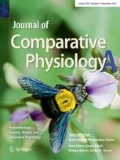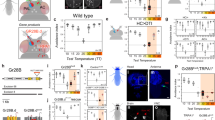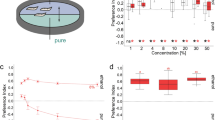Abstract
A freely walking single fly (Drosophila melanogaster) can be conditioned to avoid one side of a small test chamber if the chamber is heated whenever the fly enters this side. In a subsequent memory test without heat it keeps avoiding the heat-associated side. The memory mutants dunce 1 and rutabaga 1 successfully avoid the heated side but show no avoidance in the memory test. Wildtype flies can be trained to successively avoid alternating sides in a reversal conditioning experiment. Every single fly shows strong avoidance and a positive memory score. The new conditioning apparatus has several advantages: (1) Statistically significant learning scores can be obtained for individual flies. (2) Learning scores are obtained fully automatically without interference of the experimenter. (3) The procedure is fast, robust and requires little handling. Therefore the apparatus is suitable for largescale mutant screening. (4) Animals are not attached to a hook and thus can easily be used for breeding.
Similar content being viewed by others
Abbreviations
- dnc dunce :
-
gene
- PI:
-
performance Index
- rut :
-
rutabaga gene
- S.E.M.:
-
standard error of mean
References
Aceves-Pina EO, Booker R, Duerr JS, Livingstone MS, Quinn WG, Smith RF, Sziber PP, Tempel BL, Tully TP (1983) Learning and memory in Drosophila, studies with mutants. Cold Spring Harbor Symp Quant Biol 48: 831–839
Davis RL (1993) Mushroom bodies and Drosophila learning. Neuron 11: 1–14
DeZazzo J, Tully T (1995) Dissection of memory formation: from behavioral pharmacology to molecular genetics. Trends Neurosci 18: 212–218
Dudai Y (1988) Neurogenetic dissection of learning and short-term memory in Drosophila. Anu Rev Neurosci 11: 537–563
Dudai Y, Jan Y.-N, Byers D, Quinn WG, Benzer S (1976) dunce, a mutant of Drosophila deficient in learning. Proc Natl Acad Sci USA 73: 1684–1688
Eyding D (1993) Lernen und Kurzzeitgedächtnis beim operanten Konditionieren auf visuelle Muster bei strukturellen und biochemischen Lernmutanten von Drosophila melanogaster. Diploma-Thesis, Julius-Maximilians-University, Würzburg, Germany
Gailey DA, Jackson FR, Siegel RW (1984) Conditioning mutations in Drosophila melanogaster affect an experience-dependent behavioral modification in courting males. Genetics 106: 613–623
Heisenberg M (1989) Genetic approach to learning and memory (mnemogenetics) in Drosophila melanogaster. In: Rahmann H (ed) Fundamentals of memory formation: Neural plasticity and brain function. G Fischer, Stuttgart, pp 3–45
Heisenberg M, Borst A, Wagner S, Byers D (1985) Drosophila mushroom body mutants are deficient in olfactory learning. J Neurogenetics 2: 1–30
Kandel E, Abel T (1995) Neuropeptides, adenylyl cyclase, and memory storage. Science 268: 825–826
Lofdahl K, Hirsch J (1992) Shock-avoidance (via learning orientation) of electric current of measured intensity by Drosophila melanogaster. Dros Inf Serv 71: 169–171
Quinn WG, Harris WA, Benzer S (1974) Conditioned behavior in Drosophila melanogaster. Proc Natl Acad Sci USA 71: 708–712
Tully T (1991) Physiology of mutations affecting learning and memory in Drosophila — the missing link between gene product and behavior. Trends Neurosci 14: 163–164
Tully T, Quinn WG (1985) Classical conditioning and retention in normal and mutant Drosophila melanogaster. J Comp Physiol A 156: 263–277
Tully T, Preat T, Boynton SC, Del Vecchio M (1994) Genetic dissection of consolidated memory in Drosophila. Cell 79: 35–47
Wolf R, Heisenberg M (1991) Basic organization of operant behavior as revealed in Drosophila flight orientation. J Comp Physiol A 169: 699–705
Author information
Authors and Affiliations
Rights and permissions
About this article
Cite this article
Wustmann, G., Rein, K., Wolf, R. et al. A new paradigm for operant conditioning of Drosophila melanogaster . J Comp Physiol A 179, 429–436 (1996). https://doi.org/10.1007/BF00194996
Accepted:
Issue Date:
DOI: https://doi.org/10.1007/BF00194996




